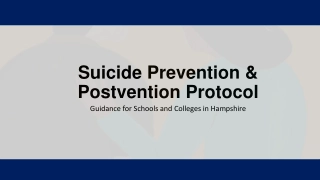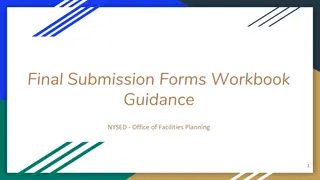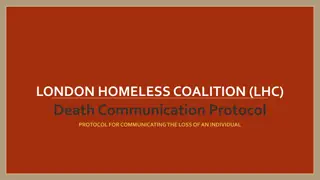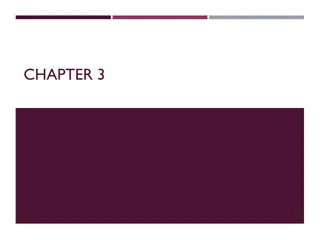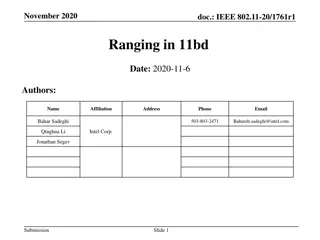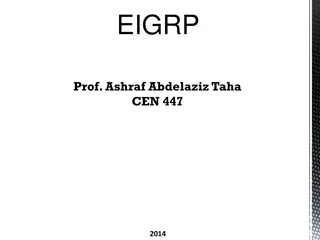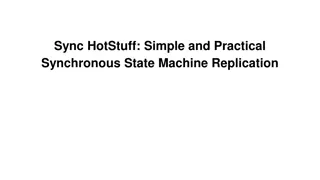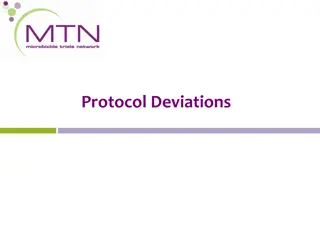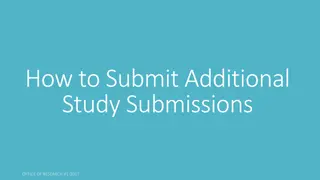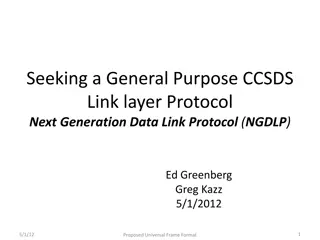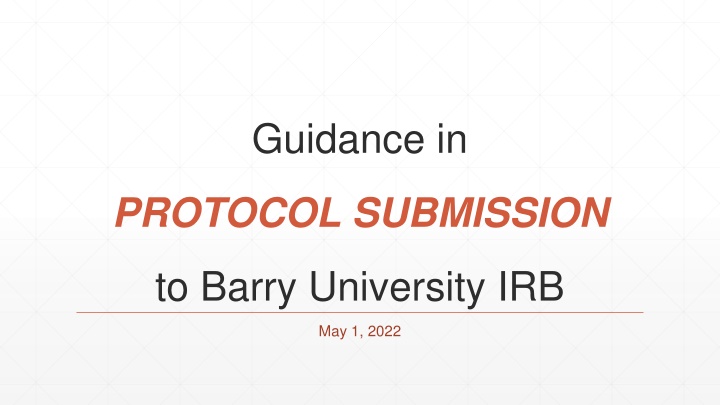
Barry University IRB Protocol Submission Guidance 2022
Get detailed guidance on protocol submission to Barry University's IRB for May 1, 2022. Learn about submission types, full board review, expedited and exempt categories, tips for successful submission, participant considerations, Barry logo usage, ethics training, and what happens next.
Download Presentation

Please find below an Image/Link to download the presentation.
The content on the website is provided AS IS for your information and personal use only. It may not be sold, licensed, or shared on other websites without obtaining consent from the author. If you encounter any issues during the download, it is possible that the publisher has removed the file from their server.
You are allowed to download the files provided on this website for personal or commercial use, subject to the condition that they are used lawfully. All files are the property of their respective owners.
The content on the website is provided AS IS for your information and personal use only. It may not be sold, licensed, or shared on other websites without obtaining consent from the author.
E N D
Presentation Transcript
Guidance in PROTOCOL SUBMISSION to Barry University IRB May 1, 2022
Objectives of this Guidance Explanation of Submission Types Full Board Expedited Exempt How to Prepare a Submission Tips for Preparing a Successful Submission Clearly explain on your Protocol what you will ask of participants Consider using boilerplate language Use the correct Barry Logo on your documents Take the correct Ethics Training What Happens Next?
Submission types: Full Board Full Board review: Full Board review is required when research: Involves more than minimal risk to participants or participants are from a protected group (specified on the Protocol form) or are vulnerable to coercion or have impaired capacity to make decisions. When any of the above-mentioned conditions are the case, the researcher must design participant selection procedures, consent procedures, and other safeguards to protect the rights and welfare of participants. It is recommended that researchers attend the meeting in which their research is being discussed (schedule a remote connection with the IRB point of contact, Anoush McNamee at 305-899-3020 or amcnamee@barry.edu) Submissions must be made before the first Friday of the month to be considered for Full Board review at that month s meeting. Researchers whose studies required Full Board approval are required to submit an annual report on IRBNet. Forms for the report can be found there.
Not all Research Requires Review by the Full Board Your project may meet criteria for either Expedition or Exemption as defined by federal standards. If your research qualifies in one of these categories, it can be reviewed by an IRB member and the IRB Chair, outside of a Full IRB meeting, for faster turnaround. The criteria for Expedition and Exemption are given in the two slides that follow.
Submission Types: Expedited Expedited review requirement: The research involves no more than minimal risk to participants Any risks to participants are reasonable in relation to anticipated benefits, if any, to subjects, and the importance of the knowledge Selection of participants is equitable and non-coercive Written Informed consent is obtained from each prospective participant or the participants legally authorized representative Informed consent will be appropriately documented When appropriate, the research plan makes adequate provision for monitoring data collected to ensure safety of participants When appropriate, there are adequate provisions to protect the privacy of subjects and to maintain the confidentiality of data
Submission Types: Exempt Exempt review: All research studies using human participants are required to have some level of review, so exempt does not mean no review it means that the research meets one of the exempt categories specified by federal guidelines for exemption (listed on the Protocol form and detailed in the Protocol Appendices). A key feature of Exempt studies is that they do not require participants to provide written informed consent, but often require that the researcher inform the participant about the study in a consent-like document. For example, online surveys should include a document that functions as a consent form, but participants do not provide a signature. When participants advance through the study after reading the document they have implicitly agreed to participate.
How to Prepare a Submission Your first step is to create an account on IRBNet so you can submit research packages for review. There is a Guidance document on the IRB Website that gives detailed instructions for how to create an account. Once you have an account, you are ready to take the required ethics trainings (see Slide 13 here, and the Guidance document on the IRB Website for detailed instructions). Your certificates of completion should be uploaded to your User File so they can be easily attached to any of your packages. After completing the required training, complete a Protocol Form to summarize your study for IRB review. All submission types use the same Protocol Form; the Barry University Institutional Review Board Protocol Form (the current version is the one approved May, 2022). Download the form from Forms & Templates (a menu option on IRBNet). Directions for completing the Protocol form are embedded within the form. If you need further clarification, detailed instructions are provided with the Video Instructions link located on the IRB Webpage. When completed, the Protocol form should be uploaded to your IRBNet package. All documents related to the study should also be uploaded as separate items (i.e., Participant recruitment materials, Consent Form, Interview questions, Surveys) Lastly, all members of the research team (those who will have contact with participants and/or identifiable participant data) must upload their ethics training certificates to the package. The package must be electronically signed.
Tip: Clearly explain on the Protocol What You Will Ask of Participants The IRB is responsible for assuring that researchers at Barry treat participants ethically. In order to determine if the intended research is ethical, the IRB member reviewing your Protocol must clearly understand exactly what your participants will experience. The Method section of the Protocol is where you specify, step by step, what will happen to your participants. Include the total time commitment required of participants and be sure you report the time consistently throughout your documents. For example, you might itemize each step like so: Participants will sign a Consent form After consenting, they will complete a Demographic Questionnaire created for the study They will then view 1 of 4 pictures of a psychotherapist s office and asked to rate the office on a Likert scale with anchors cold to warm Finally, participants will be asked to imagine the therapist who works in the office they saw, and complete the Psychotherapist Qualities Inventory The expected time commitment is no more than15 minutes
Tip: Consider Using Boilerplate Language Note that this is not required language, but rather examples of language that meet IRB standards. Using boilerplate language does not guarantee approval as is. The five (5) slides that follow provide boilerplate language for: Benefits statement Risk statement Number of Participants statement Anonymity/Confidentiality statement Using Data in Future Studies statement
Boilerplate Language: Benefits Statement In the Protocol There are no direct benefits to participants. There are no direct benefits to participants. However, the research will inform our understanding In the Consent document (writing to potential participants) There are no direct benefits to you for participating in the study. Although there may be no direct benefit to you, the research will help us learn more about
Boilerplate Language: Risk Statement For studies with minimal risk: There are no known risks to participating in this study. Risks to participating in this study are no greater than those encountered in everyday life. For studies with risk, you must describe the risks and address what you will do should there be a negative outcome to participants, such as providing referral information regarding available services to mitigate distress. Risks to participating in this study include Should you feel the need for support following your participation in this study, please call xxx hotline number at
Boilerplate Language: Number of Participants Statement When assessing the costs versus the benefits of a study, the IRB reviewer takes into consideration how may people will be exposed to the study (in part or whole). Therefore, the maximum number of participants that will possibly be recruited is the information needed. Be sure you provide a number that is more than what you need for data analysis because you are likely to have attrition and/or unusable data. The number of interest to the IRB is the number of people who may be exposed to your study, not the number you need for data analysis. The maximum number of participants that will be recruited is 150. This allows for an adequate sample while also accounting for attrition and incomplete or otherwise unusable data.
Boilerplate Language: Anonymity/Confidentiality Statement Do not cut and past this paragraph. Edit the paragraph as necessary so it fits with your study. For example, if you are not using focus groups or audio recordings, you should remove reference to those items. All study data (i.e., observation, interview, focus group, implementation, and outcome data) will be kept confidential. No participant, site, or institution names will be used in reports of the findings. Participants names (including consent forms) will be stored separately from the data. Audio recordings will be captured and stored digitally on password protected devices and transcribed by researchers. In the event that external transcription is sought, non- researcher transcriptionists will sign confidentiality agreements. Electronic data (including transcripts) will be stored on password protected computers. Hard copy data will be locked in a researcher s office. All data will be kept indefinitely, for at least five years following completion of the study. If it becomes necessary to destroy the data at a later time, electronic data will be destroyed by double deleting from the hard drive and Recycle Bin. Hard copy data will be shredded.
Boilerplate Language: Future Use of Deidentified Data A statement about whether data will be used in the future is required on Consent documents. These data with identifiers removed--may also be used in future research or distributed to another investigator without additional informed consent. These data will not be used or distributed for future research studies.
Tip: Use the Correct Barry Logo on Your Documents Any research document that is created for your study must contain a Barry logo. For example: Recruitment flyer Consent form Gatekeeper letter To avoid the improper use of available logos such as using the President s Seal the IRB would like the logo shown here to be the one used by researchers.
Tip: Take the Correct Ethics Training Detailed instructions for how to find and take the required ethics training modules can be found on the IRB Website in Practical Guidance in CITI CERTIFICATION for Barry University IRB. In summary, all people working with participants and/or identifiable participant data must complete two (2) training modules. The modules are identical aside from the examples used so either set of modules is appropriate, but you may want to take the modules that best fit their discipline: The modules are: 1. Social and Behavioral Research-Basic Refresher course AND the Social and Behavioral Responsible Conduct of Research course OR 2. Biomedical Research-Basic Refresher course AND the Biomedical Responsible Conduct of Research course
What Happens Next: A Full Board Review Either you or an IRB reviewer notes that the study requires a Full Board review The IRB Chair verifies that the study requires a Full Board review The study is scheduled for review at the next IRB meeting Step 1 Step 2 Step 3
What Happens Next: An Expedited Review OR an Exempt Review You justify on your Protocol that your study meets criteria for Expedited or Exempt status. The IRB contact person assigns your package to an IRB member for reviewer Step 1 Step 2 Step 3 The IRB member reviews the study within 1 week and notifies the IRB Chair of the review outcome The IRB Chair writes a letter to you reporting the review outcome (Approval, Required Revisions, or Rejection)


